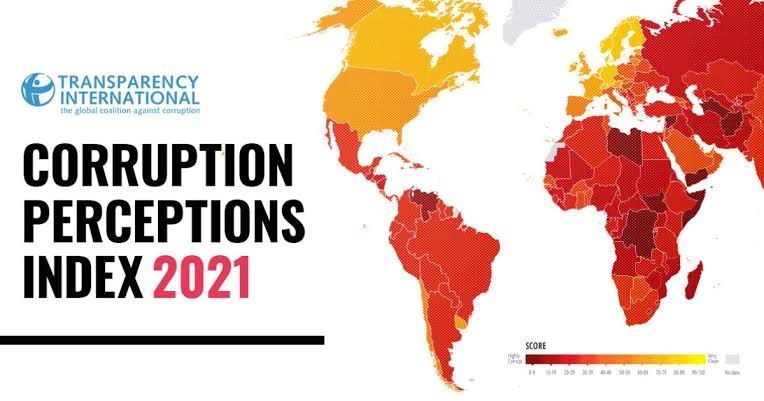Nigeria Drops Again In Latest Transparency International Corruption Ranking
 Nigeria has dropped again on the Corruption Perception Index (CPI) published by Transparency International (TI).
Nigeria has dropped again on the Corruption Perception Index (CPI) published by Transparency International (TI).
According to the 2021 ranking released on Tuesday by the agency, Nigeria dropped five places.
The country scored 24 out of 100 points — ranking 154 out of 180 countries.
This is Nigeria’s second consecutive year of a downward spiral on the TI’s CPI ranking. The country’s score dropped from 26 in 2019 to 25 in the 2020 assessment, and further to 24 in the latest 2021 record.
Transparency International tweeted on Tuesday;
The 2021 Corruption Perceptions Index released by Transparency International today shows corruption is on the increase in Nigeria.
The country scored 24 out of 100 points in the #CPI2021, which is one point less compared to the score of 2020.
In the Corruption Perceptions Index 2021, Nigeria ranks 154 out of 180 countries and territories, falling back five places from the rank of 149 in 2020.
In the Corruption Perceptions Index 2021 Nigeria ranks 154 out of 180 countries and territories, falling back five places from the rank of 149 in 2020.#CPI2021
— TransparencIT (@TransparencITng) January 25, 2022
Also on its website, Transparency International explained that Nigeria hit a historic low on the 2021 CPI.
TI on its website said;
More than 100 powerful individuals were exposed as having used anonymous companies to buy properties with a total worth of £350 million in the United Kingdom alone. Secretive dealings among Nigeria’s powerholders were previously reported as part of the Panama papers and FinCEN Files.
The CPI is TI’s tool for measuring the levels of corruption in the systems of various countries around the world. The maximum points a country can score is 100 points, and the least is zero. Zero signifies the worst performing countries and 100, the best-ranked.
It added;
The organisation listed seven weaknesses that impede Nigeria’s fight against corruption while calling for an immediate improvement for the sake of ordinary Nigerians.
The seven weaknesses include the damning audit report; security sector corruption; failure to investigate high profile corruption cases; illicit financial flows (IFFs); absence of asset recovery, protection of whistle-blowers, and other key anti-corruption legal frameworks; judicial challenges; corruption in the COVID-19 response and Twitter ban, shrinking civic space and intimidation of human rights defenders.
